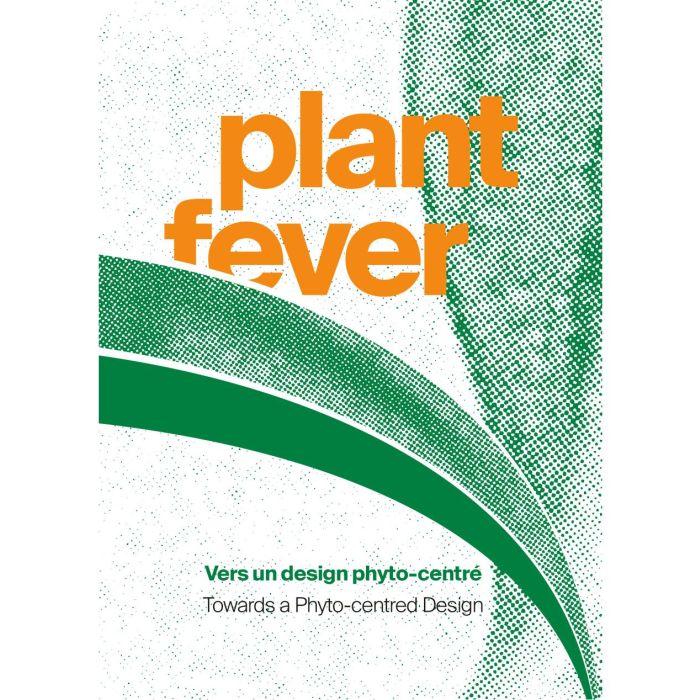My Cart
Your cart is empty
Looks like you haven't made your choice yet.
- Subtotal
Plant Fever

Towards a phyto-centred design - Vers un design Phyto-centré
- Stichting Kunstboek
- Expo: 18/10/2020 - 07/03/2021, C.I.D. Grand Hornu
- by Edited by d-o-t-s (Laura Drouet & Olivier Lacrouts). Foreword by Marie Pok. With contributions by E. Coccia, C. Collet, dach&zephir, Q. Hiernaux, Overmind, a.o
Click here
More Information
| Publisher | Stichting Kunstboek |
|---|---|
| ISBN | 9789058566577 |
| Author(s) | Edited by d-o-t-s (Laura Drouet & Olivier Lacrouts). Foreword by Marie Pok. With contributions by E. Coccia, C. Collet, dach&zephir, Q. Hiernaux, Overmind, a.o |
| Publication date | October 2020 |
| Edition | Paperback with flaps |
| Dimensions | 240 x 170 mm |
| Illustrations | 100 col. & bw ill. |
| Pages | 224 |
| Language(s) | Eng./Fr. ed. |
| Exhibition | C.I.D. Grand Hornu |
Description
For centuries, our inherent alienation from nature has prevented us from truly seeing plants and understanding them as more than simple materials or decorative objects. Can design help us change our perspective and reveal their potential as allies?
Edited by d-o-t-s (Laura Drouet & Olivier Lacrouts) / Foreword by Marie Pok / With contributions by Emanuele Coccia, Carole Collet, dach&zephir, Quentin Hiernaux, Overmind, Catriona A. H. Sandilands, Ana Silva, Penny Sparke, Trajna collective
Eeuwenlang heeft onze vervreemding van de natuur ons ervan weerhouden om het potentieel van planten als meer dan eenvoudige materialen of decoratieve objecten werkelijk te begrijpen. De voorbije jaren hebben nieuwe wetenschappelijke ontdekkingen en filosofische benaderingen onze relatie met planten een nieuwe vorm gegeven. Het dualisme tussen mens en natuur, dat zo sterk geworteld is in het westerse denken, werd steeds meer in vraag gesteld.
In navolging van het geloof van de Amerikaanse ecoloog Ian Baldwin dat we moeten proberen te denken als planten, gingen ontwerpers, wetenschappers en ingenieurs zich verdiepen in de structuren en het gedrag van planten. Planten werden bondgenoten in de zoektocht naar oplossingen voor huidige en toekomstige sociale en milieuproblematieken.
Plant Fever wil de toekomst van het design bekijken vanuit dit nieuwe plantaardige perspectief, we evolueren hierbij van een mensgericht design naar fytodesign waarin de plantenwereld centraal staat. Dit boek toont onder meer werk van creatievelingen uit meer dan 20 landen en exploreert begrippen als plantenblindheid, eco-feminisme, bosbouw, biomimicry en upcycling, maar ook postkolonialisme en culturele landschappen.
Notre profond détachement de la nature nous a longtemps empêché de vraiment voir les plantes et de les considérer comme davantage que des ressources ou des objets de décoration. Le design peut-il nous aider à changer de perspective, en nous montrant les plantes en tant que véritables alliées ? / Sous la direction de d-o-t-s (Laura Drouet & Olivier Lacrouts) / Préface de Marie Pok / Avec les contributions de Emanuele Coccia, Carole Collet, dach&zephir, Quentin Hiernaux, Overmind, Catriona A. H. Sandilands, Ana Silva, Penny Sparke, Trajna collective
Pendant des siècles, notre profond détachement de la nature nous a empêché de 'voir' les plantes et de les considérer comme plus que de simples ressources ou objets de décoration. Pourtant, des découvertes scientifiques et réflexions philosophiques récentes suggèrent qu'il est urgent de repenser notre rapport au monde végétal et de questionner le dualisme humain/nature si profondément enraciné dans la pensée occidentale. Faisant échos aux mots de l'écologiste américain Ian Baldwin, qui suggère qu'il serait bon d'essayer 'de penser comme les plantes', nombreux sont les designers, scientifiques et ingénieurs qui commencent à considérer les plantes comme de potentiels alliés pouvant nous aider à faire face aux problèmes environnementaux et sociaux actuels et à venir.
Plant Fever envisage le futur du design non plus d'un point de vue humano-centré mais phyto-centré. Du design de produits à la mode en passant par des dispositifs open source et des objets mêlant botanique et nouvelles technologies, une sélection d'environ 50 projets permettra d'explorer des notions tels que la 'plant blindness', le biomimétisme et le recyclage valorisant, l'éco-féminisme, mais aussi le post-colonialisme.
Pensée comme une exposition militante, Plant Fever ne craindra pas de prendre position, de poser des questions et d'engager le public dans une conversation positive et constructive.
For centuries, our inherent alienation from nature has prevented us from truly seeing plants and understanding them as more than simple materials or decorative objects. Can design help us change our perspective and reveal their potential as allies? / Edited by d-o-t-s (Laura Drouet & Olivier Lacrouts) / Foreword by Marie Pok / With contributions by Emanuele Coccia, Carole Collet, dach&zephir, Quentin Hiernaux, Overmind, Catriona A. H. Sandilands, Ana Silva, Penny Sparke, Trajna collective
For centuries, our inherent alienation from nature has prevented us from truly understanding the potential of plants as more than simple materials or decorative objects.
In recent years, however, new scientific discoveries and philosophical approaches have reframed our relationship with them, questioning the dualism human/nature so much rooted in Western thinking. Echoing the belief of American ecologist Ian Baldwin that "we should try to think like plants", designers, scientists and engineers, started to look into plants’ structures and behaviours adopting them as allies to develop solutions for current and upcoming environmental and social issues.
Plant Fever proposes to look at the future of design from this new vegetal perspective, moving from a humancentred to a phyto-centred design. Spanning from products and fashion items to material research, open-source devices and emerging technologies, a selection of approx. 50 exhibits - representing the work of creatives from more than 20 countries - will investigate notions such as plant blindness, eco-feminism, forestry, biomimicry and upcycling, but also post-colonialism and cultural landscapes.
Conceived as a militant exposition, Plant Fever will not fear to take a stand, ask critical questions and call for new radical perspectives, involving the public in a positive, inspiring and constructive conversation.

Plant Fever
